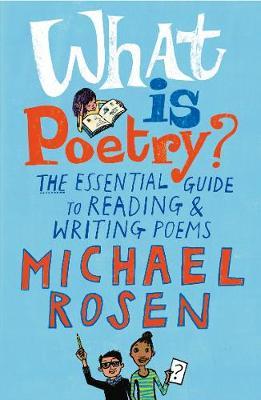I am completely unschooled in the art of writing and appreciating poetry so when I was presented with several shelves of poetry to maintain in the children’s poetry collection, my knowledge was at best murky and at worst dismissive. However, I did have a feeling that it was somehow important, and I wanted to do my best to find out why. I googled and read websites, blogs and opinion pieces, and I learnt that not only is poetry important, in fact it is IMPORTANT!
 Poetry inspires creativity and self-expression, the exploration of language and the permission to break ‘rules’. And yes, while some poem forms do have rules (looking at you, haiku) there are a whole range of styles and poetic devices the aspiring poet can choose to use if they wish. Prolific children’s author Michael Rosen has written an excellent book called What is Poetry?: The essential guide to reading and writing poems. In it he acknowledges that poetry is not easy to define so instead writes about ‘what poetry can do’ which is such a lovely way of making it accessible and engaging. I think this quote taken from the book’s introduction really sums up the universality of poetry:
Poetry inspires creativity and self-expression, the exploration of language and the permission to break ‘rules’. And yes, while some poem forms do have rules (looking at you, haiku) there are a whole range of styles and poetic devices the aspiring poet can choose to use if they wish. Prolific children’s author Michael Rosen has written an excellent book called What is Poetry?: The essential guide to reading and writing poems. In it he acknowledges that poetry is not easy to define so instead writes about ‘what poetry can do’ which is such a lovely way of making it accessible and engaging. I think this quote taken from the book’s introduction really sums up the universality of poetry:
‘Poetry belongs to all of us; everyone can read poems, make up poems or share poems with others. Though we often talk about poetry being dense or difficult, poems are able to present complicated or challenging ideas in ways that we carry around in our heads. They help us ask questions about the world, how we use words and who we are. (What is Poetry?, 2016, pg 6)
Exposure to poetry for babies and preschoolers helps develop language and encourages brain development. Rhyme and repetition are fantastic for memory and language acquisition, and one of the reasons that nursery rhymes are so popular is that the rhythm within them is modelling the flow of conversation. Check out our book list Great Poetry, just in a picture book! to find some great reads for younger tamariki.
The National Library of New Zealand have a fantastic section on Poetry on their website and how "...poetry enhances wellbeing through self-expression and empathy, and engages children with reading and writing". And with ‘Reading for Pleasure’ becoming a welcome addition to the refreshed New Zealand Curriculum, poetry can be another way to engage with reading, especially for those who don’t enjoy more traditional reading. Our website has reading lists for Classic children’s poetry and Poetry books centred around specific topics which is a fantastic way to learn new information.
In 1999 UNESCO adopted 21 March as World Poetry Day to ‘celebrate one of humanity’s most treasured forms of cultural and linguistic expression and identity’ and to recognise that poetry can span cultures, continents and different spoken languages.
With all this in mind and with the desire to inspire people to have a go, we ran a poetry competition at Te Hāpua: Halswell Centre to celebrate National Poetry Day. The prize was to have your poem custom printed on a tote bag and we had a wide range of entries from haiku and anagram poems to blackout poetry and longer verse.

The creativity and self-expression were wonderful and inspiring, and we were blown away at the effort put into by the participants. Many shared personal experiences, and things that were special to them, whilst others explored imagined settings and scenarios or experimented with language and format. A big thank you to everyone who participated and I hope everyone can be inspired to have a go at a little poetic creativity.
More poetry
- Our poetry page, including poetry for children
- Poetry and Short Story Reference Center
- National Poetry Day
Emma
Librarian - Community, Te Hāpua: Halswell Centre












Add a comment to: The Joy of Poetry